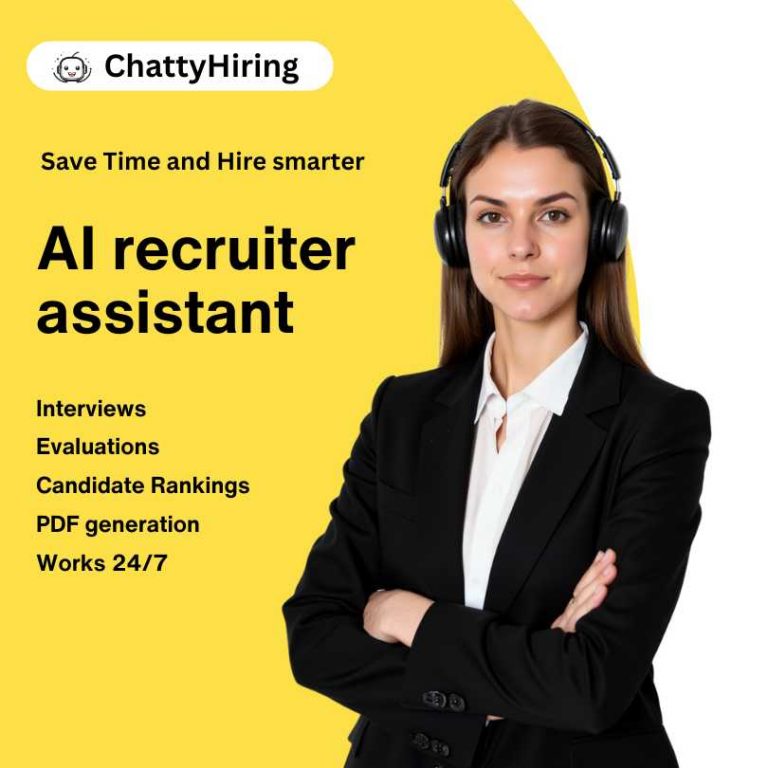In the dynamic world of talent acquisition, the introduction of artificial intelligence (AI) into recruitment practices marks a significant leap forward. The traditional recruitment model has often being characterized by time-consuming processes and significant overhead costs. This is being revolutionized by the emergence of AI-driven virtual recruiters.
This cutting-edge approach not only enhances the efficiency of hiring strategies but also offers a suite of benefits that are increasingly compelling for businesses of all sizes. Let’s delve into the transformative impact of employing virtual recruiters, emphasizing the advantages of hiring an AI worker and the strategic value of outsourcing recruitment processes.
The Digital Transformation of Recruitment
The digital age has ushered in a new era for recruitment. The integration of AI technologies have streamlined and optimized the hiring process. At the forefront of this revolution is the concept of the virtual recruiter, a powerful AI tool designed to enhance every aspect of talent acquisition. By leveraging advanced algorithms and machine learning capabilities, virtual recruiters are setting new standards for efficiency, effectiveness, and reach in the recruitment domain.
1. Streamlined Recruitment Process
The most immediate benefit of integrating a virtual recruiter into your hiring strategy is the substantial efficiency gain. This not only accelerates the hiring cycle but also ensures comprehensive candidate consideration, minimizing the risk of overlooking potential talent due to human error or constraints.
- Rapid Resume Screening: AI-driven virtual recruiters can process and evaluate thousands of resumes in mere seconds, using complex algorithms to identify the most suitable candidates based on the job specifications and required skills.
- Automated Candidate Ranking: These systems not only identify qualified candidates but also rank them according to their suitability for the position, ensuring that recruiters can quickly focus on the top prospects.
- Continuous Learning and Improvement: Virtual recruiters continuously learn from each hiring process, improving their screening algorithms over time to become more efficient and accurate in identifying potential candidates.
2. Cost-effective Hiring
The financial implications of hiring practices are a significant consideration for any business. Virtual recruiters offer a compelling solution by dramatically reducing the costs associated with traditional recruitment methods.
- Reduced recruitment overheads: By automating the initial stages of the recruitment process, companies can save on the costs associated with certain redundancy in human recruiters.
- Pay-Per-Action Pricing Model: Virtual recruiters can often operate on a more flexible pricing model. This allows companies to pay based on the actions performed (e.g., per resume screened or per interview scheduled), leading to more predictable and manageable costs.
- Scalability: AI-driven recruitment solutions can easily scale up or down based on the company’s hiring needs. This provides flexibility and cost efficiency, especially for businesses with fluctuating recruitment demands.

3. Enhanced candidate matching
Virtual recruiters transcend the limitations of traditional keyword-based matching methods through their ability to analyze a vast array of data points. Moreover, the accumulation of candidate data enriches the organization’s talent database, continuously improving the efficacy of future recruitment efforts.
- Comprehensive data analysis: Virtual recruiters analyze a wide array of candidate data points. From professional experience and educational background to soft skills and cultural fit, ensuring a holistic view of each applicant.
- Dynamic profiling: AI algorithms can create dynamic profiles of candidates by linking disparate data sources. This provides a more nuanced understanding of each candidate’s capabilities and potential fit for the company.
- Self-improving algorithms: The machine learning component means that with every job filled, the system becomes better at matching candidates to job descriptions, ensuring an increasingly higher quality of candidate recommendations over time.
4. 24/7 Recruitment operations
The non-stop operational capability of virtual recruiters addresses one of the most significant constraints of human-led recruitment: availability. With AI systems, recruitment activities can proceed around the clock, accommodating candidates’ preferences for interaction outside of conventional business hours. .
- Round-the-clock candidate engagement: Virtual recruiters operate 24/7, allowing candidates to interact with the recruitment process at their convenience. This is particularly beneficial for attracting talent in different time zones.
- Immediate response to applications: AI systems can provide immediate feedback and next steps to applicants. This enhances the candidate experience and maintains engagement throughout the recruitment process.
- Maximize your time: the 24/7 operational capacity ensures that a recruitment process that was triggered on friday will already have candidates to be analized on monday morning.

5. Languages and global talent pool
By outsourcing recruitment to an AI worker, businesses unlock access to a global talent pool. Virtual recruiters can engage with candidates in multiple languages and from various cultural backgrounds, ensuring that the search for the ideal candidate is truly borderless.
- Multilingual Capabilities: Virtual recruiters can communicate with candidates in multiple languages. This breaks down linguistic barriers and broadens the search for talent beyond local markets.
- One recruiter that can talk more than 30 languages: With the ability to reach out candidates worldwide, companies do only need to use only one AI worker instead of hiring multiple recruiters, saving time and efficiency.
- Cultural Sensitivity and Adaptation: Advanced AI can adapt its communication style to match cultural norms and preferences of candidates from different backgrounds. This facilitates smoother interactions and offers a better understanding of each candidate’s unique context.
6. Bias Reduction
One of the most transformative aspects of AI-driven recruitment is the potential to reduce unconscious bias in the hiring process.
- Objective candidate evaluation: By focusing solely on data and qualifications, virtual recruiters minimize the impact of unconscious biases that might affect human recruiters, promoting a fairer selection process.
- Diversity and Inclusion: The objective approach of AI recruitment tools helps increase workplace diversity. Managers can ensure candidates are evaluated based on their abilities and potential, rather than subjective criteria.
- Compliance and Ethical Hiring Practices: AI-driven recruitment processes can be designed to comply with local and international hiring laws and best practices, further reducing the risk of biased hiring decisions and promoting ethical standards in recruitment.
Conclusion: The Future of Recruitment
The adoption of virtual recruiters represents a significant evolution in recruitment practices, offering a myriad of advantages that align with the strategic objectives of modern businesses. From enhancing operational efficiency and cost-effectiveness to improving candidate matching and expanding global reach, the benefits of integrating AI into the recruitment process are clear and compelling.
As technology continues to advance, the role of the AI worker in recruitment will undoubtedly grow, providing a competitive edge to those organizations that embrace this innovation. By incorporating keywords such as hire recruiter, hire AI worker, and outsource recruiter, businesses can navigate this evolving landscape with confidence, making informed decisions that leverage AI to achieve their recruitment and organizational objectives.
The integration of AI and human intuition in recruitment is poised to become the new standard, offering the best of both worlds—a harmonious blend of efficiency, insight, and humanity. As we move forward, it is clear that the future of recruitment lies in the strategic use of AI, promising a more efficient, inclusive, and effective approach to talent acquisition.
-

A passionate advocate for the future of HR innovation. With expertise in leveraging AI to revolutionize recruitment processes, Carlos has a clear vision: empower HR teams while creating meaningful candidate experiences.
View all posts





